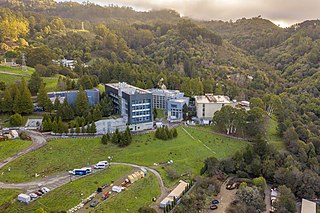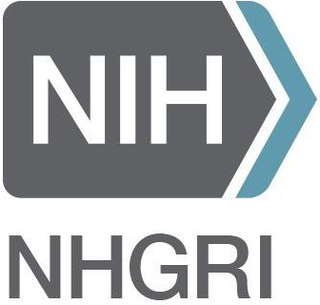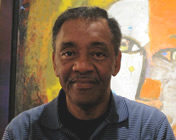
Lawrence Berkeley National Laboratory (LBNL), commonly referred to as Berkeley Lab, is a United States national laboratory that is owned by, and conducts scientific research on behalf of, the United States Department of Energy. Located in the hills of Berkeley, California, the lab overlooks the campus of the University of California, Berkeley, and is managed by the University of California system.

The United States Department of Energy (DOE) is an executive department of the U.S. federal government that oversees U.S. national energy policy and manages the research and development of nuclear power and nuclear weapons in the United States. The DOE oversees U.S. nuclear weapons program, nuclear reactor production for the United States Navy, energy-related research, and domestic energy production and energy conservation.

Pacific Northwest National Laboratory (PNNL) is one of the United States Department of Energy national laboratories, managed by the Department of Energy's (DOE) Office of Science. The main campus of the laboratory is in Richland, Washington.

The School of Computer Science (SCS) at Carnegie Mellon University in Pittsburgh, Pennsylvania, US is a school for computer science established in 1988. It has been consistently ranked among the top computer science programs over the decades. As of 2022 U.S. News & World Report ranks the graduate program as tied for second with Stanford University and University of California, Berkeley. It is ranked second in the United States on Computer Science Open Rankings, which combines scores from multiple independent rankings.

The National Human Genome Research Institute (NHGRI) is an institute of the National Institutes of Health, located in Bethesda, Maryland.

The Courant Institute of Mathematical Sciences is the mathematics research school of New York University (NYU), and is among the most prestigious mathematics schools and mathematical sciences research centers in the world. Founded in 1935, it is named after Richard Courant, one of the founders of the Courant Institute and also a mathematics professor at New York University from 1936 to 1972, and serves as a center for research and advanced training in computer science and mathematics. It is located on Gould Plaza next to the Stern School of Business and the economics department of the College of Arts and Science.

David S. Eisenberg is an American biochemist and biophysicist best known for his contributions to structural biology and computational molecular biology, a professor at the University of California, Los Angeles since the early 1970s and director of the UCLA-DOE Institute for Genomics & Proteomics since the early 1990s, as well as a member of the California NanoSystems Institute (CNSI) at UCLA.
The Oden Institute for Computational Engineering and Sciences is an interdisciplinary research unit and graduate program at The University of Texas at Austin dedicated to advancing computational science and engineering through a variety of programs and research centers. The Institute currently supports 16 research centers, seven research groups and maintains the Computational Sciences, Engineering and Mathematics Program, a graduate degree program leading to the M.S. and Ph.D. degrees in Computational Science, Engineering and Mathematics. The interdisciplinary programs underway at the Oden Institute involve 123 faculty representing 23 academic departments and five schools and colleges. Oden Institute faculty hold positions in the Cockrell School of Engineering, College of Natural Sciences, Jackson School of Geosciences, Dell Medical School and McCombs School of Business. The Institute also supports the Peter O'Donnell, Jr. Postdoctoral Fellowship program and a program for visiting scholars through the J. Tinsley Oden Faculty Fellowship Research Fund. Organizationally, the Oden Institute reports to the Vice President for Research.
The Office of Science is a component of the United States Department of Energy (DOE). The Office of Science is the lead federal agency supporting fundamental scientific research for energy and the Nation’s largest supporter of basic research in the physical sciences. The Office of Science portfolio has two principal thrusts: direct support of scientific research and direct support of the development, construction, and operation of unique, open-access scientific user facilities that are made available for use by external researchers.
The Krell Institute is a 501(3)(c) corporation located in Ames, Iowa near Iowa State University. The organization was founded in 1997 in support of the US Department of Energy's Computational Science Graduate Fellowship program (CSGF), and has since grown to include a number of other US government contracts towards its mission of serving the science, technology, and education communities.

Leslie Dewan is an American nuclear engineer. She was the co-founder and chief executive officer of Transatomic Power. Dewan is a member of the board of MIT and was named a Young Global Leader by the World Economic Forum.

Milton Dean Slaughter is an American theoretical and phenomenological physicist and affiliate professor of physics at Florida International University.Slaughter was a visiting associate professor of physics in the Center for Theoretical Physics, University of Maryland, College Park while on sabbatical from Los Alamos National Laboratory (LANL) of the University of California from 1984 to 1985. He is also chair emeritus and university research professor of physics emeritus at the University of New Orleans (UNO). Prior to joining UNO as chair of the physics department: He was a postdoctoral fellow in the LANL Theoretical Division Elementary Particles and Field Theory Group (T-8); LANL Theoretical Division Detonation Theory and Applications Group (T-14) staff physicist; LANL Theoretical Division affirmative action representative and staff physicist; LANL assistant theoretical division leader for administration and staff physicist (T-DO); LANL Nuclear and Particle Physics Group staff physicist—Medium Energy Physics Division (MP-4); and LANL Historically Black Colleges and Universities (HBCU) project manager (laboratory-wide).

The Computational Biology Department (CBD) is a division within the School of Computer Science at Carnegie Mellon University in Pittsburgh, Pennsylvania, United States. It is located in the Gates-Hillman Center. Established in 2007 by Robert F. Murphy as the Lane Center for Computational Biology with funding from Raymond J. Lane and Stephanie Lane, CBD became a department within the School of Computer Science in 2016.
Joseph "Joe" Lawrence Zachary is an American computer scientist and professor at the University of Utah. He is known for his work in computer science education as a charter member of the United States Department of Energy Undergraduate Computational Engineering and Science (UCES) Project, an education initiative to improve the undergraduate science and engineering curriculum through computation. He was influential in promoting a new approach to teaching scientific programming to beginning science and engineering students.
Janet Marie Conrad is an American experimental physicist, researcher, and professor at MIT studying elementary particle physics. Her work focuses on neutrino properties and the techniques for studying them. In recognition of her efforts, Conrad has been the recipient of several highly prestigious awards during her career, including an Alfred P. Sloan Research Fellow, a Guggenheim Fellow, and the American Physical Society Maria Goeppert-Mayer Award.
Kristen Lorraine Grauman is a Professor of Computer Science at the University of Texas at Austin on leave as a research scientist at Facebook AI Research (FAIR). She works on computer vision and machine learning.

Amanda Randles is an American computer scientist who is the Alfred Winborne and Victoria Stover Mordecai Assistant Professor of Biomedical Sciences at Duke University. Randles has been an assistant professor of biomedical engineering and computer science at the university and works at the Duke Cancer Institute. Her research interests include biomedical simulation and high-performance computing.

Athena Safa Sefat, born 1977 in Iran is a Canadian/American physicist, with research focus on quantum materials and correlated phenomena. She was a senior scientist at Oak Ridge National Laboratory and led the DOE Basic Energy Science on "Probing Competing Chemical, Electronic, and Spin Correlations for Quantum Materials Functionality". She is currently a Program Manager at U.S. Department of Energy (DOE), Office of Science, Basic Energy Sciences, with Division of Materials Sciences and Engineering.
Cora Dvorkin is an Argentine physicist who is an Associate Professor at the Physics Department at Harvard University. Dvorkin is a theoretical cosmologist. Her areas of research are: the nature of dark matter, neutrinos and other light relics, and the physics of the early universe. Dvorkin is the Harvard Representative at the newly NSF-funded Institute for Artificial Intelligence and Fundamental Interactions (IAIFI)'s Board. She has been awarded the 2019 DOE Early Career award and has been named the "2018 Scientist of the year" by the Harvard Foundation for "Salient Contributions to Physics, Cosmology and STEM Education". She has also been awarded a Radcliffe Institute Fellowship and a Shutzer Professorship at the Radcliffe Institute. In 2018 she was awarded a Star Family Challenge prize for Promising Scientific Research, which supports high-risk, high-impact scientific research at Harvard. In 2020, Dvorkin gave a talk on machine learning applied to the search for dark matter as part of the TEDx Río de la Plata event.

Susan Kathryn Gregurick is an American computational chemist. She is the associate director for data science at the National Institutes of Health (NIH). Gregurick is the director of the NIH Office of Data Science Strategy.












